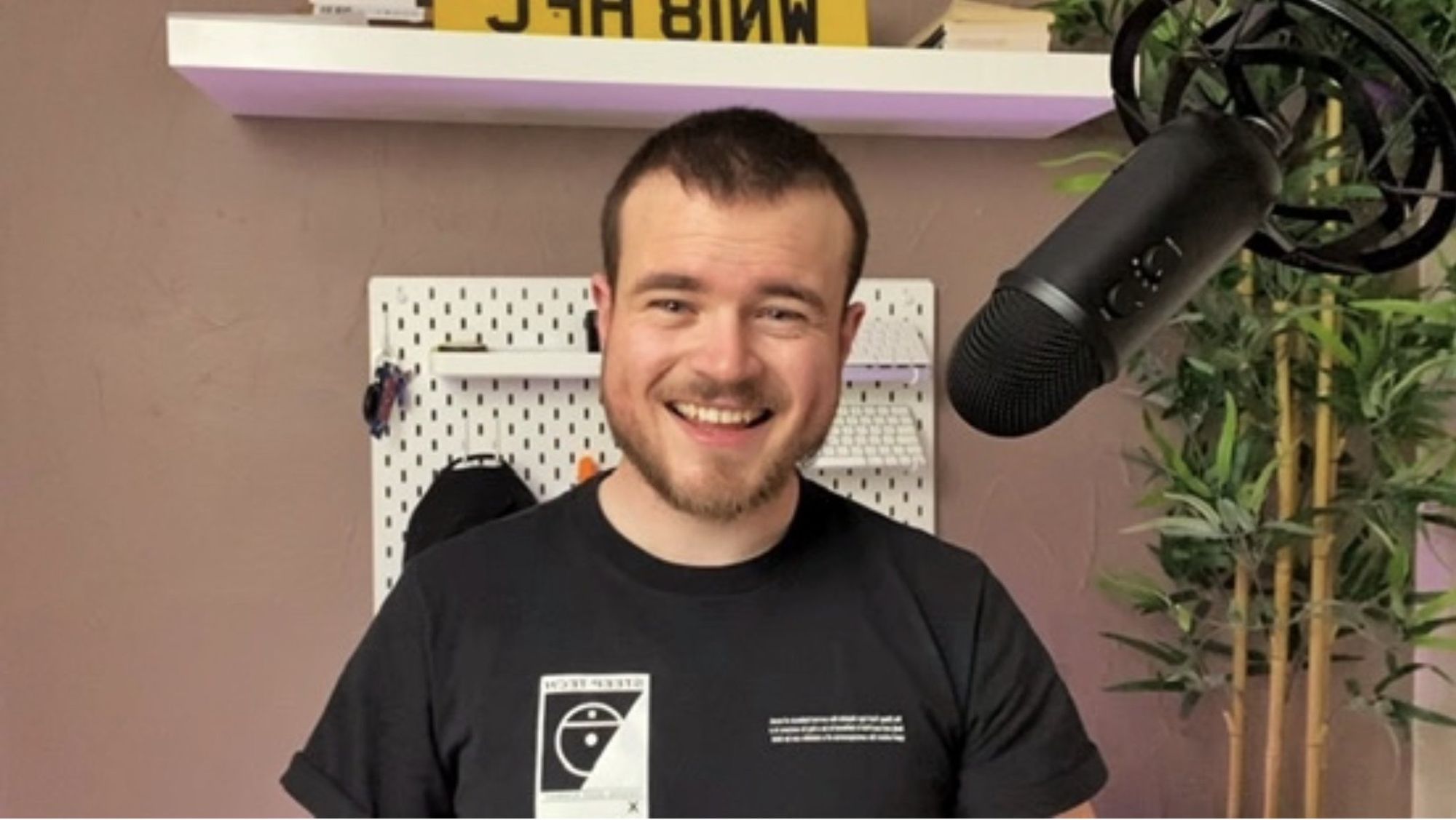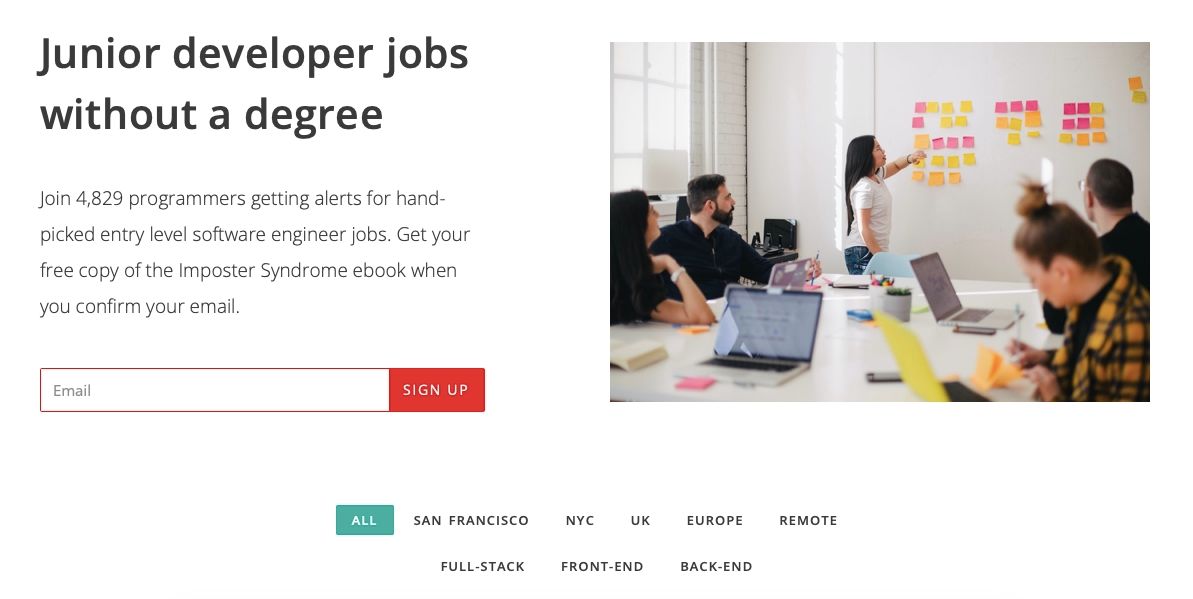I chatted to Alex Booker, a self-taught web developer about teaching himself to code and defying the high school teachers that put him down. Alex is very enthusiastic about the benefits of coding so if you're curious about getting into programming, this is the interview for you!
Hey, so can you introduce yourself?
Hey Pete, thank you for having me!
My name's Alex! I’m a self-taught developer and host of The Scrimba Podcast. There, I interview experienced and newly-hired developers to learn how they became successful so anyone listening can too!
Growing up in the North Wales countryside, learning to code was a lonely endeavor, but I don’t regret not getting a Computer Science degree. As I hope to highlight in this interview, there’s more than one path to success!
Eventually, I built the skills, network, and, honestly, confidence to move to London, where I now live! I started the podcast with Scrimba to be the help I wish I had back then and in this interview, I hope to extend some of the advice that helped me the most!

Why did you learn to code?
To me, learning to code is a superpower. In school, I got shameful grades. I just couldn’t muster the motivation to memorize poems or learn maths formulas I knew I would never use.
As a result, teachers labeled me stupid, but coding lit a spark in me. I got to see the result immediately, and my imagination ran wild. At first, coding was a hobby but at some point, I realised the unlimited career potential.
Coding is such a unique industry where you can leapfrog ahead if you are hard-working and driven. It’s not like being an accountant where every qualification and promotion is laid out in front of you. You can work from home. You can get visas to work abroad. If you hustle, you can become a Senior in no time and earn incredible money. Hell, you can even code your own app and become a millionaire!
I always thought coding was like walnuts. Walnuts go well on anything (if you think about it). If you like football, you can work at a football app like OneFootball. If you’re passionate about journalism, you can work on an app like The Economist. You can make a social impact. Coding affords us the freedom and variety to find the autonomy and purpose we all want.
Even if I was an average coder, I remember thinking I could land a job paying more than the teachers who put me down. Not to mention, there was always the potential to start a company or join a company and get equity. I am not a founder, but I have had the opportunity to work at and help shape some incredible start-ups, one of which I got a little stake in the exit!
How has your life changed since learning to code?
Learning to code allowed me to leave the nest, move to London, and prove all my teachers wrong. In London, I got to work with people who used to work at Facebook, Google, Microsoft, as well as the inspiring founding team. It shaped me in ways I never expected. I got to travel the world for events and sales calls, learn from world-class developers, and see how production code is made.
Through hard work and by surrounding yourself with intelligent, kind people, you can become even better than you ever imagined! I thought I might become a freelancer, but I learned you’re a product of your environment. Getting in the trenches with amazing folks worked for me, but I wouldn’t knock any approach as we are all different.
Later, I got a chance to move to America and participate in a coveted start-up accelerator called TechStars. I eventually moved back to London in the wake of the pandemic.
How did you learn coding?
I learned using a variety of resources. My earliest memory is learning about booleans and conditional logic (a fancy way to describe if statements) by watching Stanford videos (specifically, CS106A). The profesor, Professor Mehran Sahami blew my mind. "THIS is what a great teacher looks like," I remember thinking.
Looking back, I wish I spent more time learning how to learn. I studied hard, but most of it didn't stick. As it happens, most of what we know about learning is wrong. When we're in school, we learn to highlight and re-read until we’re familiar with the text, but that doesn't work. I am sure you can relate to reading a book, feeling productive, but not really remembering anything you read.
My advice to anyone learning to code is to slow down to speed up. Learn slower but really make sure what you're learning sticks by applying what you learn. To apply what you learn, take notes and summarise them, teach someone else what you learned, and, most importantly, build projects!
Building projects leads to something I like to call just-in-time learning, where you're constantly running into new, practical problems and solving them to develop practical, hireable skills.
Each problem will make your brain swell, and you'll sometimes feel frustrated that you don't know the answer yet, but you learn best this way because it's effortful. It’s a bit like training your muscles at the gym where if you get a pump, they grow! As a bonus, you’ll also grow your portfolio which can help you stand out come job-hunting time.
If you teach what you learn, for example, on your YouTube channel, you'll also build a personal brand, which might help you get a job. In fact, that’s exactly what happened to me!
Editor - Check out coding courses verified by self-taught developers
What was the interview process like for your first developer job?
I got my job through "luck" and Twitter. Fortunately, you can make your own luck! For a while, I had been following someone named Jack Franklin on Twitter. I looked up to Jack in the JavaScript community because he seemed to be around my age and doing some of the things I was interested in. He had already published a book and given talks in Facebook's London offices, among other things.
I didn't set out to work with Jack exactly, but he happened to share a job opening at the exciting new start-up he worked at. The company, their technology stack, and the people seemed like a perfect fit for me. "I'll apply in a few weeks once I've polished my resume and portfolio," I told myself.
The truth is, I was procrastinating. Although I'd been browsing jobs in London for some time, this is the first one I felt like I had a good chance of success. If I failed, it would have probably crushed me.
I tried hard to find the courage but in the back of my head, I remembered how terrifying it would be to move from a small village with 8,000 people to London with 8,000,000, and, regrettably, I never applied.
Fortunately, I received a lifeline.
By chance, Jack later Tweeted about a small freelance role at the company. I emailed him with a link to my GitHub, StackOverflow, and YouTube (where I had been teaching the things I was learning to remember them better). I figured, who needs a resume (or a diploma for that matter!) when we can show our ability in the open.
I coded into the night to complete the freelance task in record time, hoping to impress them. I also recorded a thoughtful YouTube presentation, which I hoped would highlight my passion and presentation skills.
A day or so later, I got this email:
"We have this job opening on our website...”
It was the one I was eyeing-up.
“I don't suppose it'd be something you're interested in? No worries if not, but let me know if you'd like to at least have a chat about it. We're pretty impressed by your work & also the Codecasts, etc, on Youtube."
Of course, I said “YES!”.
There was a 30-minute Skype call with Jack’s manager, then a take-home task, which I presented in my onsite interview.
Ahead of the interview, I spent a day learning their product, their competitors, and the type of work they're doing, which I believe gave me the edge I needed. I also brainstormed ideas to improve their product, as I thought they might like it if I was proactive. I went on a team lunch, and I met with the CTO for one last chat. The next day, I received an offer and started to prepare for my big, still scary, move to London!
Do you have tips for people who want to learn to code without doing a degree?
Most university students are now learning online, which is absurd. As a self-taught developer, you have the same educational resources available at a fraction of the cost. You should feel pretty great about that.
As I see it, the two advantages of learning to code at university are the curriculum (you have a clear path) and support network (you can ask for help and make great friends).
It's important you recognize those advantages because it's tempting to do everything alone as a self-taught developer. I highly recommend you find an online community to learn from other people's paths and have your coding questions answered.
To be great, you just have to be good consistently. When you see people in your community finding success, it should motivate you every day.
What are your career goals for the future?
I currently work at Scrimba as a Community Manager, where my mission is to help you learn to code and get your first developer job. Anyone is welcome to join, just head to scrimba.com/community.
Going forward, I am extremely excited about the weekly Scrimba Podcast where Pete from No CS Degree himself has been a guest! I love bringing you ideas and practical advice from experts and newly-hired programmers about their approach to studying, finding work, and thriving. I’ve interviewed guests from Amazon, Uber, Google, and other big companies, as well as newer developers who found work at technology start-ups, agencies, and other types of companies. Check out the full archive at https://scrimba.com/podcast
Thanks for the interview!
If you liked this you should check out the interview with Aldhair who went from a cleaner on cruiseships to become a developer after learning to code with Scrimba



